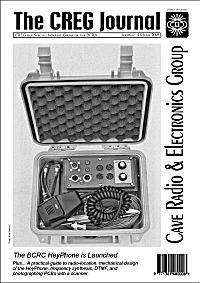
- The most recent issue to be published was 132
- For further information, please see Publishing/Despatch Schedule
- Database last updated on Mon, 01 Dec 2025 18:30:34 +0000
- Online access is currently available for all issues. Some of
the older issues are bit-map scans rather than digital copies.
journal scans.
- Online voting for CREG articles was withdrawn in June 2022. For info see
Voting for CREG articles
Contents of journal 44
June 2001
This page may take a few
seconds to load. Please wait ...
- CREG Journal
(PDF 9.9MB)
  Individual articles may be available below Individual articles may be available below
- Contents
-
- Newssheet
- BCRC HeyPhone, Foot & Mouth, Time for a Change. Meetings & News - Field Meetings, Meetings in Ireland, Award for Cave Electronics, Toolkits, Cave Photography Group, Hidden Earth. Administrivia - AGM. Diary Dates.
-
- Launch of the HeyPhone
- The HeyPhone has now been issued by the BCRC to rescue teams. Mike Bedford reports.
-
- BCRC HeyPhone - Physical Construction
- Brian Jopling, 'Jopo', describes the mechanical design philosophy for the HeyPhone and gives some instruction for those intending to build a unit or to use similar techniques for other projects.
-
- Update - HeyPhone Circuit
- Mike Bedford details some minor circuit changes to the BCRC cave radio, now called the HeyPhone, which have been advised by John Hey.
-
- Generating & Detecting Bat Calls
- Developing an ultrasonic bat detector requires experimentation using an ultrasonic sound source, ideally an 'electronic bat'. Stuart France presents a bat sound generator and then a simple yet sensitive audio front-end for a bat detector.
-
- Add-ons for the Nicola System
- A cave radio doesn't have to be a stand-alone piece of equipment. Graham Naylor explains how the Nicola System has been designed with expansion in mind and describes various add-ons.
-
- Correction
- CREGJ 41: A New Rescue Radio - the Electronic Design.
-
- Frequency Synthesis: A review
- Accurate frequency synthesis is needed for many purposes, from low frequency applications such as audio tone generation and stepper motor control, through to UHF radio. David Gibson reviews some common methods of LF frequency synthesis and suggests some methods of building a 'frequency-agile' cave radio.
-
- An RF Power Indicator for Cave Radio Transmitters
- This add-on unit uses an LED or the transceiver loud-speaker to indicate the power level. Another contribution from Jean-Jacques Fauchez translated by John Rabson.
-
- DTMF and its Use in Cave Communication
- DTMF is well-known by telephone engineers and radio amateurs but has been used infrequently in cave communication. Mike Bedford explains what it is and how it can assist in interfacing cave radios to other equipment.
-
- Web Watch
- Peter Ludwig looks at batteries and lighting.
-
- Further Reading
- If a topic in this issue interests you, this 'further reading' list, compiled by David Gibson, may be of use.
-
- Cave Surveying by Radio-location - 2
- Stuart France provides some practical guidance for those new to radio-location in this useful 'how to' guide.
-
- Speleonics
- We review the ongoing debate on LED lighting.
-
- Cave-proofing Video Cameras (part 2)
- In part 2, underground video photographer Tony Cook gives some guidance on adapting camera housings to support manual focus and exposure control.
-
- Using a Scanner as a Digital Camera
- David Gibson observes that photographing PCBs and small components is much easier with a flat-bed scanner than with a conventional camera. He demonstrates this with a scan of his experimental through-rock channel-sounding equipment.
-
- Meet the CREGgies (2)
- Who are these people we keep reading about in this journal? And what do they look like? Rosy Rabson interviews Brian Pease, John Hey and Richard Rushton.
-
- Letters to the Editor
- Feedback, debate, information & news - our readers have their say.
-

|

View Contents:

BCRA is a UK registered charity and is a constituent body of
the British Caving Association,
undertaking charitable activities on behalf of the BCA.
BCRA publishes a range of periodicals and books.
Click here for further information.
|
Searching
To Search our pages using Google, type a search
string in the box at the top of the page and hit your Return key
You can also search our publications catalogue at the British Caving Library
The CREG Journal Search Engine is a new, powerful search engine which will, sometime, be extended
to cover Cave & Karst Science. We have a keyword search facility on our Cave Science Indexes pages but this may be rather out-of-date.
|
For staff use: Link to Database
Show/Hide
download figures next to each item (if available and non-zero; you might need to refresh page first). Counters last
reset on Thu 03-Jan-2019 17:29:28 +00:00. The figures are non-unique
click-throughs.
|









